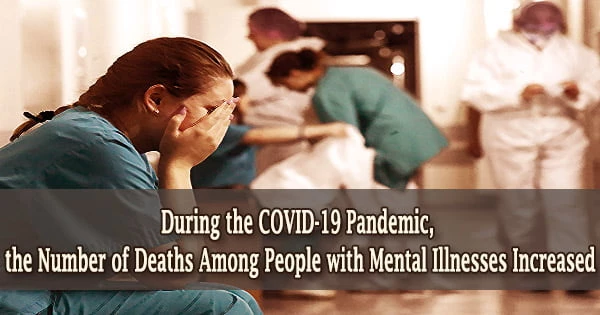According to a research-based on almost 160,000 patients, the number of mortality among persons with mental health issues and intellectual impairments increased during the COVID-19 epidemic. Prior to the pandemic, death rates among persons with serious mental illnesses were already higher than the overall population.
According to a new study published in The Lancet Regional Health Europe, mortality in persons with mental health disorders and intellectual impairments increased much more between March and June 2020, during the first wave of COVID-19, as compared to the general population.
The research was released in advance of World Mental Health Day on October 10th, 2021, which this year’s subject is “Mental Health in an Unequal World.”
According to the study, deaths from COVID-19 were nine times greater among people with learning difficulties than in the general population during the first lockdown period, and nearly five times higher in those with eating disorders. COVID-19 fatalities were almost four times greater in persons with personality disorders and dementia than in the general population, and more than three times higher in people with schizophrenia.
The study employed the Clinical Record Interactive Search (CRIS) technology to analyze anonymized data from clinical e-records of patients from South London, which was partially supported by the National Institute for Health Research (NIHR) Maudsley Biomedical Research Centre (BRC).
The results from our study paint a stark picture of how the existing vulnerability of those with mental health conditions and intellectual disabilities have worsened during the COVID-19 pandemic. The higher death rates compared to the general population were associated with more deaths from COVID-19 infection itself, as well as deaths from other causes.
Dr. Jayati Das-Munshi
Lead author Dr. Jayati Das-Munshi, Reader in Social and Psychiatric Epidemiology at King’s College London and Honorary Consultant Psychiatrist with South London and Maudsley NHS Foundation Trust, said: “The results from our study paint a stark picture of how the existing vulnerability of those with mental health conditions and intellectual disabilities have worsened during the COVID-19 pandemic. The higher death rates compared to the general population were associated with more deaths from COVID-19 infection itself, as well as deaths from other causes.”
“People living with severe mental health conditions and intellectual disabilities should be considered a vulnerable group at risk of COVID-19 mortality, as well as deaths from other causes, throughout the pandemic. We suggest a need to prioritize vaccination and optimize physical health care and suicide risk reduction, before, during, and after peaks of COVID-19 infection in people living with mental health conditions.”
Researchers analyzed anonymized data from 167,122 patients at South London and Maudsley NHS Foundation Trust on fatalities between 2019 and 2020 using the NIHR Maudsley BRC’s Clinical Records Interactive System (CRIS). They looked examined death ratios for nine mental illnesses and intellectual impairments, as well as ethnicity.
These were adjusted for age and gender, and then compared to England and Wales’ five-year average weekly deaths (from 2015 to 2019). These were then compared to population statistics from London to see if the estimates could be explained by local area effects.
Senior author Rob Stewart, Professor of Psychiatric Epidemiology & Clinical Informatics at the Institute of Psychiatry, Psychology & Neuroscience (IoPPN), King’s College London, said: “These findings and their implications illustrate the importance of being able to learn from the information contained in health records. We have worked with the Maudsley’s CRIS platform for nearly 15 years now and a key focus has been to highlight inequalities in mortality and general health. Because CRIS information is updated on a weekly basis, this has allowed us to track the progress of the COVID-19 pandemic and its impact on mental health services.”
Deaths among people with mental illnesses and intellectual disabilities decreased from July to September 2020 as COVID-19 instances decreased and lockdowns were lifted, but they remained twice as high as the general population, which was close to the numbers before the pandemic.
Within the sample, similar death trends were identified across minority ethnic groups, with South Asian and Black Caribbean adults with severe mental health disorders and intellectual impairments 2.5 times more likely to die during the pandemic than in the year preceding the pandemic. People with serious mental illnesses and intellectual impairments, both White British and Black African, had higher death risks.
Researchers came from King’s College London’s Institute of Psychiatry, Psychology & Neuroscience, the Centre for Implementation Science, and the ESRC Centre for Society and Mental Health.
The Academy of Medical Sciences and the NIHR Maudsley Biomedical Research Centre financed the research. The paper ‘All-cause and cause-specific mortality in people with mental disorders and intellectual disabilities, before and during the COVID-19 pandemic: cohort study’ was published in The Lancet Regional Health Europe.’





